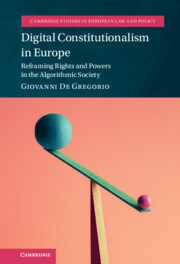Acknowledgements
This book is the result of a mix of places and people. It is an attempt not only to fill a gap in the debate around constitutionalism, public law and technology but also to give voice to those who have led me to address the challenges for constitutional democracies in the algorithmic society.
My research interest in this area has been primarily supported by my academic community in Milan, particularly by Oreste Pollicino who has kindly written the Foreword for this book as a symbol of his role in my academic path and my supervisor Giulio Enea Vigevani who has always contributed to enriching my research ideas. And I cannot escape from a special mention to Marco Bassini who has always been a great source of academic advice and guidance.
An invaluable part of these years has been travelling and exchanging views with different academic communities which have profoundly contributed to this research. My experience in Oxford has played a critical role in encouraging me to look beyond constitutionalism. In this sense, Linda Mulcahy and Nicole Stremlau have played a critical role in showing that there is life beyond the law. Also, Roxana Radu has tremendously contributed to my studies on Internet governance. I could express the same feeling for my visiting fellowship in Haifa where I had the pleasure to meet Niva Elkin-Koren and Maayan Perel. Both have enriched my research on content moderation and platform governance moving my perspective beyond public law, looking at the role of private ordering.
Participating in academic networks has also been critical for this research. I have always learned from talking about digital constitutionalism with Francisco De Abreu Duarte, Nicolas Suzor, Dennis Redeker, Edoardo Celeste, Amelie Heldt, Clara Iglesias Keller and Nicola Palladino. The community of the Internet Governance Forum and, particularly, the Dynamic Coalition on Platform Responsibilities have also played an important role. In this case, I cannot escape from mentioning Luca Belli and Nicolo Zingales who have contributed to my research on the powers of online platforms. Likewise, the IACL Research Group on ‘Algorithmic State, Society and Market’ has been an infinite source for studying algorithmic governance and, in this case, the merit is of Giovanni Sartor, Amnon Reichman, Andrea Simoncini, Hans-W. Micklitz and Erik Longo. Besides, my studies on policy have been particularly enriched by the collaboration with Elena Perotti and my participation in the Internet and Jurisdiction Policy Network, led by Bertrand de la Chapelle and Frane Maroevic who continuously push the debate further in terms of content regulation and platform governance.
I cannot delay further from mentioning at least two scholars who have been continuously supportive during these years, Sofia Ranchordas and Catalina Goanta. Both have encouraged me to move my research forwards and have always created an environment for me to grow and learn from senior scholars.
When it comes to this book, special thanks go to Pietro Dunn who has provided incredible feedback and the editors at Cambridge University Press, Tom Randall and Becky Jackman, for their invaluable support, to Helen Kitto who has taken care of the copy-editing work, Akash Datchinamurthy for the type-setting and Ruth Martin for the indexing.
I consider this book to be the result of conversations and exchanges of views. It is not just the result of my doctoral studies but also of relationships which, in some cases, have also led to new friendships. Reading and writing have been critical in these years, but the most relevant part has been played by people.

